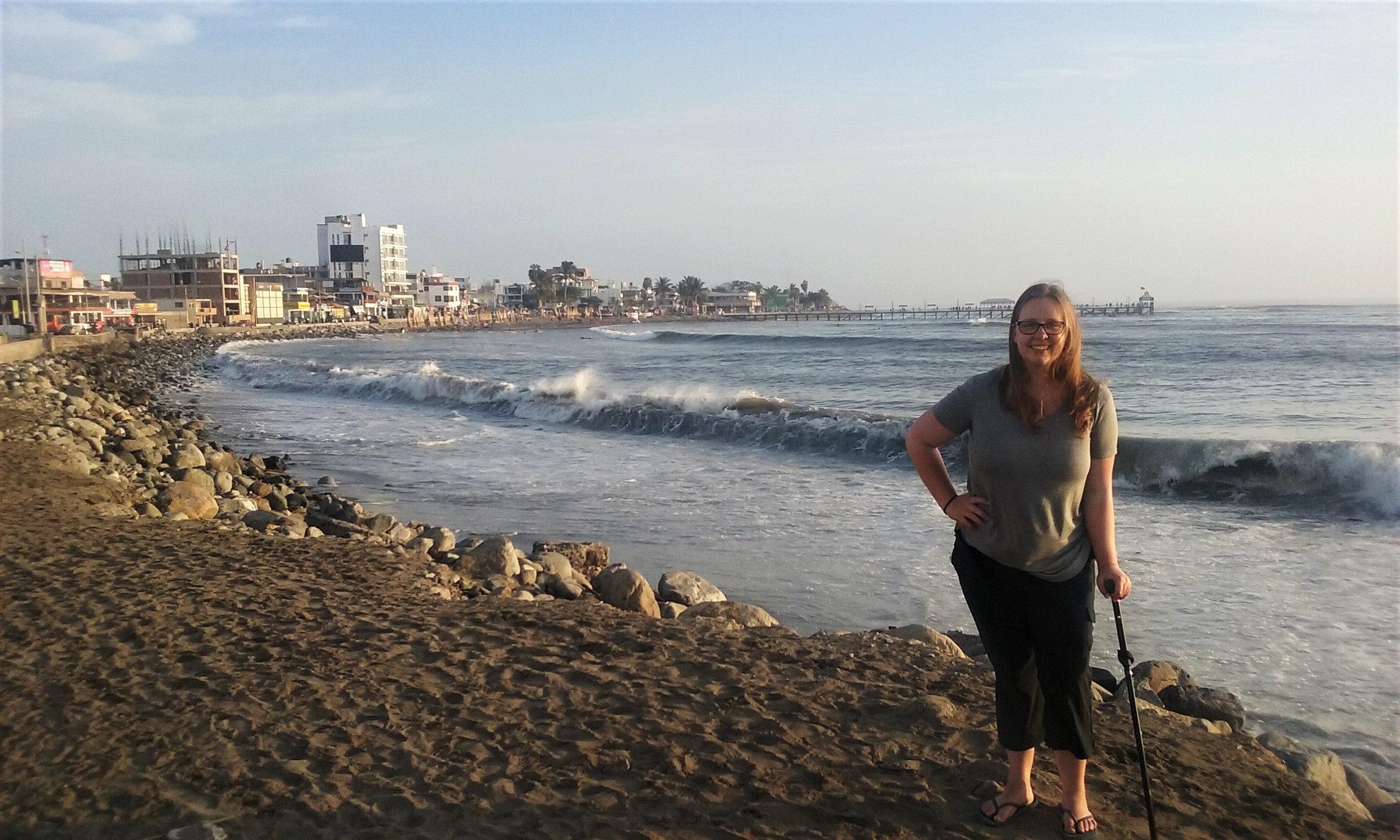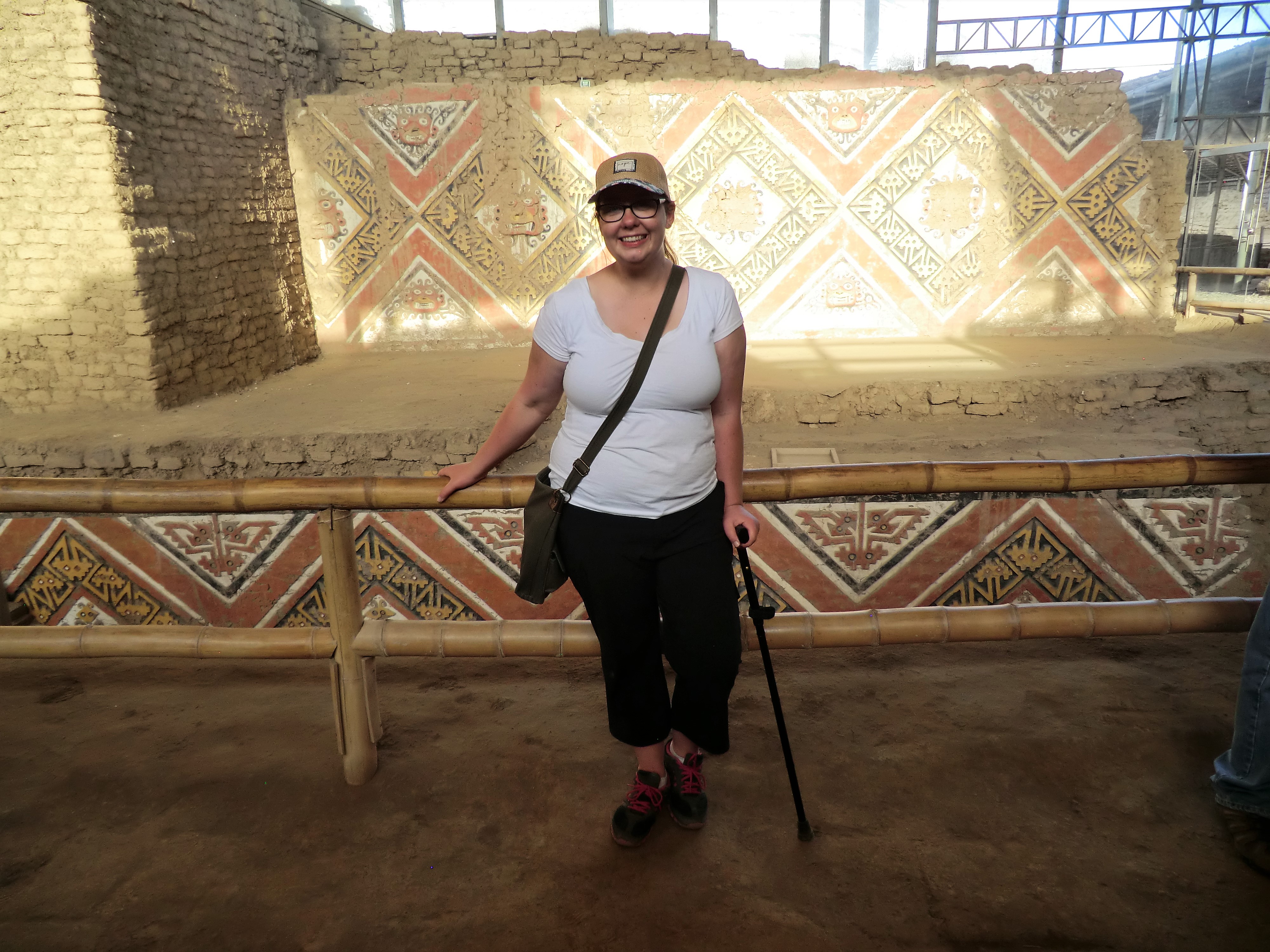Hola de Peru,
Living in Huanchaco is such a beautiful experience. I am in love with the sights, the sounds, the smells, and most of all the kind people I’ve met. I am in an ethnographic field school which takes me to three different cities across La Libertad region of Peru: Trujillo, Huanchaco, and El Milagro. I have a very different experience than my classmates do, however, because I have a physical disability and am chronically ill.
Walking the streets of La Libertad, I notice every doorway. Thresholds are an immediate sign of whether people with disabilities can easily enter or exit. Entrances here are typically flat (the same level as the ground) or they have a large step up to enter (much like in the U.S). Government regulations have only recently dictated that public buildings have access ramps, so anything constructed before that legislation is not required to be accessible. There is also a correlation between poverty and access: the wealthier an area, the more accessible it is, and the unfortunate vice versa.
Then, of course, I have my individual struggle with my health. Each day is an uphill climb at 50% capacity. Luckily I have a great cane, a program director who supports and believes in me, and the incredible Gilman team backing my every step up that mountain.

This photo was taken on the north end of Huanchaco beach and shows the view of the markets and the fisherman’s pier. The beach is accessible for people with disabilities on the southern side, but not on the northern end. There are too many rocks and it becomes quite steep to get from the road to the ocean.
Studying abroad with health challenges definitely has its own unique set of challenges, but that is no reason that it cannot still be an incredible experience. Here are some tips that have helped make my experience go a little smoother.
- Some countries and cities are more accessible than others. When deciding where to study abroad, do some research about the destination. Are buildings required to have access ramps and/or elevators? Is public transportation accessible to your needs? Are roads paved or dirt? Will you be able to get your medications in the host country? It’s important to consider these things in addition to the academic program.
- Build a support network. I cannot stress enough the value of making friends who will stand by you and support you when you feel ill. Find a friend in each class. Become close with your roommate. So far, having supportive friends has made the experience abroad more manageable, accessible, and enjoyable.
- Along those same lines, have an open line of communication with your professors and your program director. Let them know how you are doing, what you need, and what would make the experience more feasible for you. It is very likely they will be more than willing to accommodate your needs. That has certainly been the case for me.
- Learn medical terminology in your host country’s language. Before coming to Peru, I made sure to brush up on my Spanish vocabulary of the human anatomy and symptoms. If you can express how you feel and what your body is going through, you can better receive the medical help you may need.
- Similarly, find out your prescription names in your host country. Some medications go by different names in different countries. If you will be receiving refills while abroad, be sure to know what to ask for from the pharmacist. It’s also a good idea to have a note from your doctor listing and describing all your medications (both in English and your host language).
- Call venues ahead of time to see if they are accessible for your needs. If you are going out and are worried the destination may not be able to suit your needs, give them a call and find out. Call restaurants and ask if they can accommodate your food allergy. Ask if a building has an elevator. You can even ask what the venue is like so you can determine what support-gear or mobility device you will need. If the venue cannot meet your exact needs, they may be able to work out some other type of accommodation.
- Rest and take care of your health. I know being in a new place is exciting, and it is incredibly tempting to want to fill every minute. However, you will have a much better experience if you also take care of your body. You will miss out on more if you are only functioning at half-capacity. Take siestas, say no to late nights every now and again, get enough sleep, stay hydrated, eat well, exercise (if applicable). Your experience abroad will be so much better if your health is a priority.
- Don’t be afraid to ask for help. This is the tip I struggle most with. But you will not get what you need if you don’t ask for it. Talk to your professors, your friends, people you meet on the street. They can offer assistance and are often quite willing to do so.

This is at the Moche site ‘The Temple of the Moon’ and is one of the oldest archaeological civilizations found in Peru. I had to break out my cane at the Huaca because the only way in or out was through several flights of stairs. We also went to Chan Chan that day, which is a Chimu site, and is completely flat and is entirely wheelchair accessible!
Studying abroad is a very attainable goal for people with disabilities! As my health declined in my teenage years, I worried I would never have the chance to study abroad. Now, I am living in Peru, learning more than I ever dreamed possible! Just because I’m sick doesn’t mean I can’t accomplish my dreams. I simply have to go about them a different way. And there is nothing wrong with different.
Best of luck to you all in your journeys, travels, studies, and dreams! May you have good health and amazing experiences!
Saludos!



